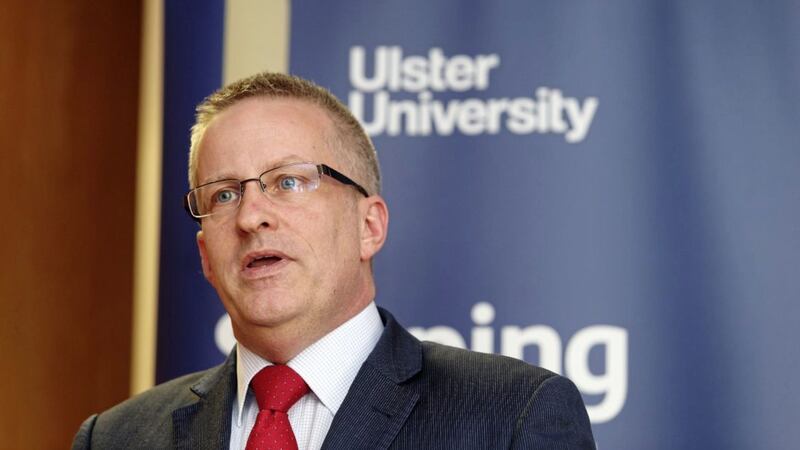With budget cuts and Brexit putting pressure on higher education institutions, education correspondent Simon Doyle speaks to Prof Paddy Nixon, head of Ulster University, about what the future holds for students and staff
-------------
HIGHER tuition fees and greater numbers of international students could tackle the "massive" underfunding of universities, a leading academic has said.
Budget cuts, political instability and Brexit are taking their toll on higher education.
Ulster University (UU) said in 2015 it would cut 210 jobs and 1,200 student places due to a funding reduction.
Since 2011, its budget from Stormont fell from £89 million to closer to £70m.
In an interview with The Irish News, UU Vice Chancellor Professor Paddy Nixon said the decline in funding is undermining industrial and economic strategies.
Less money, Prof Nixon said, meant fewer students.
The most recent 2 per cent cut, he added, was being managed and would have no detrimental impact. But the lack of an executive made predicting further cuts difficult.
"We have flagged the potential of further and possible significant cuts and we have no sight of what they might really look like. Without any leadership from the executive - clearly we want devolved administration back - we have no clarity on what direction those cuts would take," he said.
"What we know, because the Barnett formula is producing a reduced amount of money to Northern Ireland over a period of time, and because there is a ringfencing of health and education, the remaining departments have to take a cut and then a question comes `how is that realised?'"
Prof Nixon said certain things were within UU's control such as increasing international students, who pay significantly higher fees.
"We are planning on a range of scenarios that go from the worst to best case, and we certainly have to take a prudent approach.
"When we made the last cuts, we had to take 1,200 student places out.
"What we believe both universities should do is provide broad-based education. We have the full spectrum, and that's important for Northern Ireland because as well as the skills base, you need to be providing broad education given there's only two universities.
"What that means is we can't focus cuts in one area over another. We have to think carefully about the skills needs of Northern Ireland but also broader societal needs in terms of the education we provide.
"Of those 1,200, the majority are going to come out of larger faculties - computing, engineering, business, life and health sciences - all those things where the skill base is exactly the thing that Northern Ireland needs to provide for inward investment, job growth, economic development.
"This demise of funding of higher education in Northern Ireland really is undermining the industrial strategy, the economic strategy, even the corporation tax is being completely undermined by the fact that we have a less-educated, smaller skill base for those companies who want to come in.
"If we keep on the current trajectory, by 2020 we will have budgets reduced by 32 per cent which is a phenomenally large number."
UU already receives £48m less than benchmark institutions in England. A total of £26m of that is government money. In addition, it has 108 fewer academic staff than comparable sized universities.
"We are simply under-resourced," Prof Nixon said.
One solution is a hike in tuition fees. Options for higher education funding - including one that could see a three-year degree costing £27,000 - were being considered prior to Stormont being suspended.
'Home' students at the north's institutions are paying more than £4,000 a year for the first time. Annual costs ranging from £6,500 to £9,000 had been considered.
Prof Nixon said UU was planning for budget cuts of 2, 4, 8 and 12 per cent.
"A 12 per cent cut is a 25 per cent reduction in student numbers, so that's a huge impact and that massively undermines the economic proposition, so you have to think if we are running a £2,500 less per year per student than the rest of the UK, how do we fill that gap?
"Obviously there's the just follow the English system and go for straight for £9,200, free up the money in the government coffers to apply elsewhere - probably unpalatable in the political context. The Welsh system is very interesting, they have used some, but not all of, the freed up funds to provide the most fair grant system.
"One option for us is some sort of commitment from government to base-lining their contribution and allowing us to raise to some midpoint and £6,500 is about the midpoint.
"We need to have the same level of funding per student as the rest of the UK which is of the order £9,000 to £9,250 while we get about £7,500."
Against the backdrop of a fragile political landscape and the urgency of Brexit negotiations, UU this year convened a symposium of business people, academics, unions, and health care representatives to ensure that Northern Ireland worked constructively to secure the best possible deal.
Ireland's leading body of experts in the sciences and humanities believes the north's universities will be impacted most by Brexit.
Northern Ireland members of the Royal Irish Academy said they could see no benefits or opportunities which could be gained for higher education and research.
A report last year also warned that UU risked losing about €20m (£17.5m) in EU funding and tuition fees.
Prof Nixon said this remained an active area of discussion but he was "increasingly less concerned about Brexit and its impact".
"We, since February, have won about £26m of Interreg funding and about 8 per cent of our EU grants we have Republic of Ireland partners in, so there are a lot of issues in there about the relationship and how we collaborate. But if they can sort out the UK buying in, then some of those will resolve."
While there are fears EU undergraduates, including those from the Republic, could be charged pricier international fees post-Brexit, Prof Nixon said this was "up in the air and difficult to speculate".
There are about 1,400 students from the Republic at UU, and Prof Nixon said he was keen to retain "some degree of mobility on the island".








